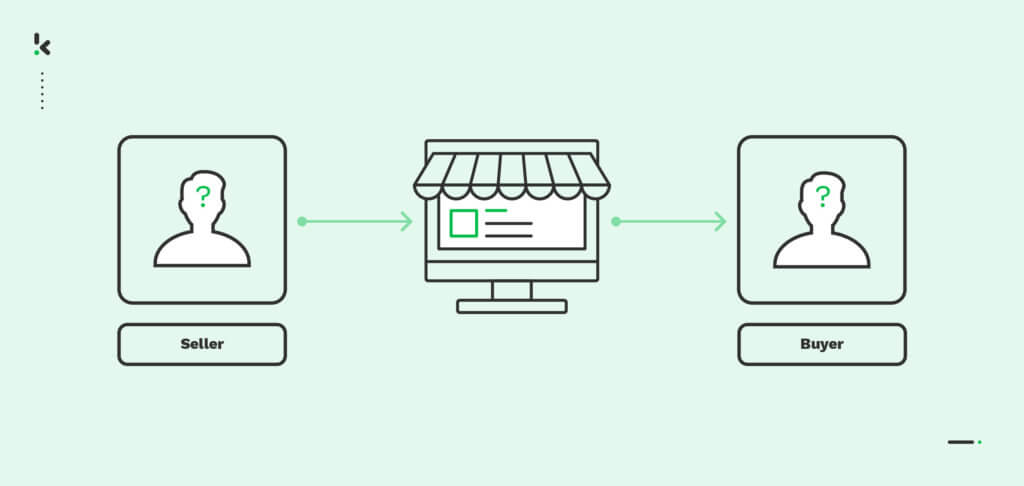

Online shopping and thus corresponding marketplaces are more popular than ever before. While they are convenient and allow us to do all our shopping snuggled on a couch, they mean quite some risk for the buyer, seller, and marketplace too.
Why, you may ask? As a buyer, you run the risk of (accidentally) buying the secondhand iPhone from a fake seller, transferring the money but never receiving the product you purchased. While simultaneously, the seller runs the risk of selling a product to a fake buyer who might never pay or doesn’t even exist. On top of that, the marketplace runs the risk of not knowing who their customers (seller and buyer) are, offering their service to complete strangers.
As you can see, there is a lot of risk running involved, which can cause serious trouble for all three parties. The main problem lies in the anonymity of the seller and buyer, which is caused by not purchasing products directly from a business, but having a third party (the marketplace) involved.
Luckily, for all three parties, troubles can be resolved quickly, by implementing an identity verification software into the account opening process of the marketplace.
Why marketplaces need such an identity verification solution, which regulations apply, and how Klippa can help you will be discussed in the remainder of this blog.
Keep reading!
Why marketplaces need identity verification
As a marketplace, you offer an online shopping platform to thousands of sellers and buyers. People from all over the world hide behind their computers to sell and buy goods in a quick and convenient way. This makes a marketplace the bridge between the seller and buyer.
While the marketplace boom of the last couple of years (thanks to the pandemic) is convenient for buyers and lucrative for sellers, it created new opportunities for bad behavior, such as credit card, identity, and chargeback fraud.
For the marketplace this means a two-sided fraud risk, damaging the marketplace’s reputation on both sides of the equation. On the one hand, buyers could illegally take over an existing account, use stolen credit card details or engage in cashback fraud. On the other hand, a seller could offer fake products, display fake reviews or charge money and never deliver the product.
While all of this is obviously bad and harmful for everyone involved, there is one inherent problem we didn’t discuss in detail yet. Anonymity. As previously mentioned, buyers and sellers are hiding behind a computer. How do you as the marketplace then know who your customers (seller and buyer) are? How do you know if you can trust them and want to allow them to use your services?
Luckily, there is an easy solution to this. By verifying the identity of sellers and buyers in the onboarding process while they are setting up an account, you can prevent people from committing marketplace fraud in numerous ways.
So far so good. The perspective of the marketplace should be clear now. But how does the whole story affect the vendor (seller) and buyer?
Vendor verification for marketplaces
As a marketplace, you want to know who is selling their goods on your platform. Therefore, merchant verification is a necessary process that should be implemented. But this doesn’t only benefit the marketplace.
Buyers want to be sure to not purchase products from fraudulent sellers, but instead want to trust that the marketplace has verified vendors and ensures the legitimacy of products and sellers.
Following so-called Know Your Business (KYB) regulations that confirm the legal status of a business is therefore a wise consideration for marketplaces.
Buyer verification for marketplaces
To know your customer is always a good idea. Whether you are the marketplace or vendor, customer verification just adds this extra layer of security and trust. By verifying the identity of customers you know who you are selling to and debunk attempts of e.g., credit card fraud, identity fraud or theft of a user account.


Following Know Your Customer (KYC) regulations generally enables you to verify identities but also allows you to avoid fines that occur when not being compliant with KYC rules and regulations. After all, you want to ensure that products are sold to legit people who really are who they say they are.
Now that we know why identity verification is needed let’s have a look at its benefits next.
Benefits of identity verification
We already established that a marketplace is a great platform for people that intend to commit fraud. With identity verification, the risk of fraud can be minimized if not eradicated completely. Let’s have a look at the reasons why. Identity verification:
- Allows marketplaces to detect document fraud
- Enables marketplaces to prevent identity fraud
- Minimizes the risk of credit card fraud
- Allows marketplaces to certify their users as “verified users”
- Builds trust between marketplace and customers (seller & buyer) and trust between seller and buyer
- Enables marketplaces to be compliant with regulations
The benefits are pretty clear and straightforward, which should ease your decision to commit to an identity verification solution. But more on this later.
In the next section, we first want to have a closer look at regulations that specifically apply to marketplaces.
Regulations for marketplaces
As of 12 July 2020, a new regulation called platform-to-business regulation (P2B) has been enforced by the European Commission. This rule intends to create a fair, predictable, and transparent business environment. The P2B Regulations are applicable to businesses in the European Union, and platforms needed to ensure compliance with the regulation before the 12th of July 2020.
On top of that, since May 2022 a new European Directive put new laws for online shops and platforms in place. Those involve more transparency for customers about who they are dealing with directly. Marketplaces must specify if a customer is dealing with a business or a private individual and what the terms of the agreement are.
Additionally, there are international guidelines that are applied by 100 countries across the globe. Those five guidelines state:
- Overarching principles that should be adopted by marketplaces
- Government actions that ensure the safety of products sold online
- The responsibilities of online marketplaces
- Complaints and redress mechanisms
- Consumer information and education
Note: Before you offer your services as a marketplace please inform yourself and conduct your own research in order to comply with all rules and regulations necessary.
Now coming to the end of the blog, it became clear that a majority of the challenges and risks faced by online marketplaces can be minimized by verifying identities from the get go.
We understand that for a marketplace, it is pretty much impossible to verify all customer identities manually as it is not scalable. To minimize the work and make this verification process scalable, automated identity verification software is proposed as a solution.
A secure marketplace with Klippa identity verification
Klippa offers an ideal automated identity verification solution for marketplaces. Our AI-based software makes verifying the identity of buyers and sellers a quick, easy, and secure process. You will never be unsure about who is using your services ever again.
Klippa’s software allows marketplaces to automatically onboard new customers 24/7 while giving everyone involved a safe and comfortable business environment. Our solution can be customized to fit into your identity verification flow, allowing you to add various security layers with the following features:
- Accurate ID document verification
- Fast age verification of customers
- Elimination of identity theft through liveness detection
- Verification of identities with selfies through facial biometrics
- Automatic comparison of the selfie and the picture on an ID
- Extraction of all necessary information from documents within a few seconds
- Use of AI algorithms to detect document fraud
- Masking of sensitive information to protect them from criminals and data breaches
Additionally, we can assure you that none of your or your customer’s data that is processed with our identity verification solution is saved on our servers, allowing you to be compliant with data privacy regulations as well.
With proper documentation provided for both API and SDK, the implementation of our identity verification software is easy and flexible.
Do you have questions about how our software helps you to improve the security of your marketplace? Please contact one of our experts or book a free demo down below for more information.